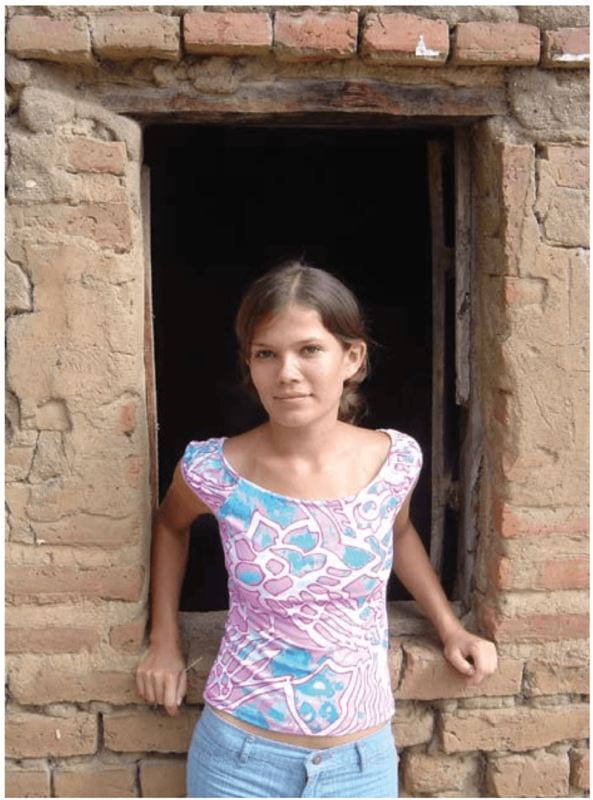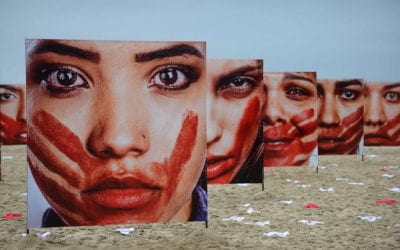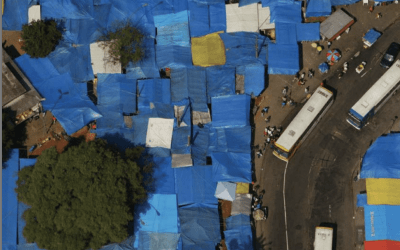Fruits of Brazil
Youth Participation Emerges as a Strategy for National Development in Brazil

Ana Nere, a community youth activist, wants to reach out beyond her rural world. Photo by Luciana Martinelli
They live in one of the greatest natural resources on earth, surrounded by immense and powerful rivers. In Amazônia, it is the rivers that determine if you get to school or to the doctor. Boat trips take at least six hours here—and that is if no storms come crashing down. “This is what it’s like being young in our community…we don’t know what young people are like in other places…I think that they want to meet us and we want to meet them, too,” says Rivaldo, age 24. Just like Rivaldo, 450 young people ages 14 to 25, from 31 riverside communities in Amazônia, want to reach out to other young people and participate in national life in Brazil. Together, they formed the Rede Mocoronga de Comunicação (Mocorongo Communication Network), organized through rural branches and community telecenters. Through small community radio stations, handwritten newspapers and television programs, youth reporters trade information about local culture, spread educational campaigns, and publish their news. While no one seeks them out to ask about their dreams and interests, they themselves are the journalists and radio operators who step-up to let the world know who they are.
ECONOMY AND SOLIDARITY
The price increase for flour almost ruined the Cooperativa Popular de Pães (People’s Bread Cooperative), created by the community of Engomadeira, a poor neighborhood of Salvador with high rates of malnutrition and unemployment. Against this backdrop of social exclusion, a new sort of economy is emerging: one of solidarity.
In the richer part of town, at the Universidade Federal of Bahia, a few students frustrated with the management program decide to act. They are, on average, 22-years-old and immensely determined to work to better society. “It’s a management course on capitalist and market-driven companies,” some students complained. Others asked: “I’m going to graduate from college…and then what? I don’t want to lead a life that won’t change the reality of how we live.” These young people banded together with professors and technical specialists to create a small organization that provides credit to collective enterprises that are excluded from traditional microcredit initiatives. Through efforts to rescue economic solidarity, Bansol, a credit bank, was born.
In a solidary economy, the supply of products and services is tied exclusively to the real demands of a community. The aim is not return on investment, but rather to attend to basic needs, generate income and solve social problems.
The credit bank saved the bread co-op, and the technical support for its production, commercialization and finances stimulated growth. “If not for the meetings with Bansol, we wouldn’t have survived,” says one member of the co-operative. The Universidade Federal da Bahia recognized the work Bansol was doing and incorporated its activities in the School of Management’s curriculum. Beyond simply giving loans to social enterprises, the young people of Bansol expand their understanding of how the economy can reduce social inequality.
THE REAL STORY IS IN BOOKS
Far from the schools, libraries and open spaces for sports and leisure lays “Cidade Tiradentes”, a neighborhood of 190,000 inhabitants on the outskirts of metropolitan São Paulo that coexists with violence, drugs and a lack of social investment. Experiences here serve as the raw material for rap verses by the youth of the Núcleo Cultural Força Ativa (Cultural Nucleus for Action). The young men and women in this group range from 20 to 29 years old and suffer daily from the consequences of social inequality. It is through books that they learn to recognize their true identity and to understand their power to create change. Força Ativa is a youth organization that works to promote Afro-Brazilian and political awareness, using rap music and other forms of hip hop to increase public awareness of the causes and effects of social exclusion and to drive action in response.
In Brazil, only one out of every four people is fully literate and can knowledgeably compare passages from books, according to the 2003 National Functional Literacy Indicator. Providing access to books and increasing the number of readers are national challenges. In 2001, Força Ativa founded Solano Trinidade, a community library. Since then, the collection has grown to more than 6,000 books, with 4,000 total readers and 30 active visitors per day. Users of the library are children, teenagers and adult men and women who come to find books on politics, national and foreign literature, sexuality and human rights. “I want people to see themselves in the stories they are reading, to be able to relate their own experiences to what’s on the pages,” says Fernanda, 27, a Força group member who runs the library. More than simply managing a community library and granting access to books, Força Ativa spreads knowledge and serves as a wind of change throughout Cidade Tiradentes.
I’M A RURAL YOUTH, I’M A BRAZILIAN
For the young people who live in semi-arid Brazil, the main worry is unemployment. In Bahia, child laborers are used for the production of sisal, a fiber used as raw material for artisan crafts, and receive minimum wage (less than US $200 a month) while the fiber trader pockets 85% of the retail price. Almost six million Brazilian youths between ages 15 and 24 live in rural areas, 1.8 million in extreme poverty and 650,000 moving to cities from rural areas (IBGE, 2000 census). The youth of the semi-arid Brazil don’t want to leave their land and move to the cities. “Our [My] fight is to keep from leaving because I can’t live off of my land. We want to get classes that will improve the quality of our work so that we can sell our products to other communities ourselves,” says Maria Luiza do Carmo. Along with 600 youths from 22 towns, she attends a monthly meeting in the offices of the Projecto Juventude e Participação Social (Youth Project and Social Participation). They work through rural trade unions and municipal youth collectives, forging partnerships with social entities and the government to create public policy courses, community radio stations, college entrance exam prep courses, and other initiatives.
The importance of quality education is tremendously important. Only 1.56% of college students Brazil are rural youths. A few collectives in the region have grown and become associations, ensuring improvements in the lives of the young in semi-arid Brazil. In some towns, there is a provision in the law calling for the creation of Municipal Youth Councils. Besides fighting for basic human rights, the youth that make up these councils are forming their own political identity and showing society that it should make youth a priority.
WITHOUT PARTICIPATION THERE IS NO DEMOCRACY
These stories are real. The main characters are teenagers who live in one of the most unequal countries on earth, Brazil. Victims of social exclusion, they number 34 million, between 15 and 24 years of age. Half are men, half are women; half are white, half are blacks, mulattos, or native Indians. A full 84% live in urban areas, and only 16% in rural areas; 12% live with families whose per capita income is one-fourth of the minimum wage; 14% don’t study, work, or search for employment; and almost half of the unemployed in the country are youth.
Nonetheless, 92% of Brazilian youth believe that their life will improve in the next few years, and close to 74% think that the good things about being young outnumber the bad. The previous stories speak to the mature fruits of Brazil, of young entrepreneurs that believe that participation is a way of life in a democracy, of youths that have a positive view of themselves and a positive outlook for their lives.
Together, they form a group of 700,000 youth who actively participate in community and social initiatives, while seven million would like to help their communities in some way. These are youths who understand and incorporate the importance of community in their lives and who know that development stems from everyone’s involvement. Ethics, solidarity and citizenship are values that they practice each day. And they are not afraid to innovate. To the contrary, they know that the way to solve old problems is by exploring new directions.
In a democracy, two forces should exist: dignity and participation. Balance between the promotion of dignity and participation in public policy indicates a mature democratic society. Nevertheless, a recent study by the United Nations Development Programme (UNDP) shows that Brazilians have little trust in democracy. Of the 18 countries surveyed, Brazil placed 15th for public support for democratic principles. In this study, 54.7% of those interviewed said they would support an authoritarian government if it meant the resolution of Brazil’s economic problems.
WINDS OF CHANGE
Aracati is a nonprofit organization whose mission is to contribute to the development of a culture of participation among Brazilian youth. Since 2001, it has developed projects related to education, enabling youth to join in social participation, political expression and informing public policies for youth.
In 2004, Aracati invited youth groups to submit stories on their experiences of community involvement. Of the 140 stories sent in from across the country, Aracati selected eight, four told briefly in the above article. These experiences are included in the book Frutos do Brasil—Histórias de Mobilização Juvenil, written by renowned Brazilian journalist Neide Duarte. Duarte also directed a documentary film, which will be released in 2007, about these experiences.
The experiences of these young fruits of Brazil point to alternative ways to live in a democratic society. Their projects incorporate partnerships from different sectors, build consensus, and above all, support active participation as a means to improve the quality of their lives and the assurance of their rights. For Brazil to address the social debt of its youth, it is of fundamental importance for the country to recognize that its youth also holds the power to make the necessary changes.
Frutos do Brasil—Histórias de Mobilização Juvenil (Fruits of Brazil – Stories of Youth Mobilization) and additional information about Aracati can be found at www.aracati.org.br.
Spring 2007, Volume VI, Number 3
Luciana Martinelliis the Founding Director of Aracati—Agência de Mobilização Social (Social Mobilization Agency); she is an Ashoka Fellow and a delegate of the Inter-American Development Bank’s Youth Network.
Tatiana Achcar, a graduate of the Pontifícia Universidade Católica de São Paulo, is a journalist who works at the crossroads of education and communication. She is Communications Director for Aracati.
Related Articles
Violence Against Women in Brazil: Public Policy and its Implementation in Rural Areas
English + Português
Eight o’clock in the evening—it’s time to gather and watch the national news program in Rio de Janeiro, Brazil.
2022: Uma Encruzilhada Histórica
English + Português
Este segundo turno da eleição 2022 no Brasil é um embate histórico entre visões de mundo. Entre concepções de vida e seus sistemas de valores. Você vai eleger (etimologia: escolher) em que mundo seria concebível viver.
Editor’s Letter: Brazil
Brazil is different. Brazil is huge. Brazil is colorful. Brazil is magic. In Brazil, the people speak Portuguese instead of Spanish.




